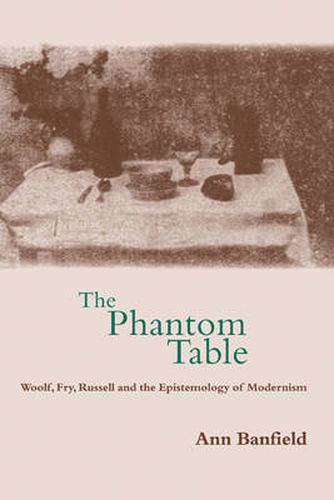Readings Newsletter
Become a Readings Member to make your shopping experience even easier.
Sign in or sign up for free!
You’re not far away from qualifying for FREE standard shipping within Australia
You’ve qualified for FREE standard shipping within Australia
The cart is loading…






Virginia Woolf identified the influence on her work of ‘the Cambridge Apostles’, the philosophical society which counted G. E. Moore, Bertrand Russell and much of male Bloomsbury among its members, as one more ‘capable of description’ than ‘the influence of my mother’. In this major study of Woolf’s relationship to Bloomsbury and the aesthetic and philosophical developments of her time, Ann Banfield subjects that influence to its first full treatment. The theory of knowledge Moore and Russell formulated, Banfield argues, profoundly affected Woolf’s conception of reality, as it did Roger Fry’s theory of Post-Impressionism, one source for Woolf’s transformations of philosophical principles into aesthetic ones. The Phantom Table is a magisterial account of Woolf’s engagement with this remarkable trinity of thinkers: Moore, Russell, Fry. It radically revises the epistemology of modernism, reconceiving the relation between realism and formalism to account for Woolf’s dual reality of sense impressions and logical forms.
$9.00 standard shipping within Australia
FREE standard shipping within Australia for orders over $100.00
Express & International shipping calculated at checkout
Stock availability can be subject to change without notice. We recommend calling the shop or contacting our online team to check availability of low stock items. Please see our Shopping Online page for more details.
Virginia Woolf identified the influence on her work of ‘the Cambridge Apostles’, the philosophical society which counted G. E. Moore, Bertrand Russell and much of male Bloomsbury among its members, as one more ‘capable of description’ than ‘the influence of my mother’. In this major study of Woolf’s relationship to Bloomsbury and the aesthetic and philosophical developments of her time, Ann Banfield subjects that influence to its first full treatment. The theory of knowledge Moore and Russell formulated, Banfield argues, profoundly affected Woolf’s conception of reality, as it did Roger Fry’s theory of Post-Impressionism, one source for Woolf’s transformations of philosophical principles into aesthetic ones. The Phantom Table is a magisterial account of Woolf’s engagement with this remarkable trinity of thinkers: Moore, Russell, Fry. It radically revises the epistemology of modernism, reconceiving the relation between realism and formalism to account for Woolf’s dual reality of sense impressions and logical forms.